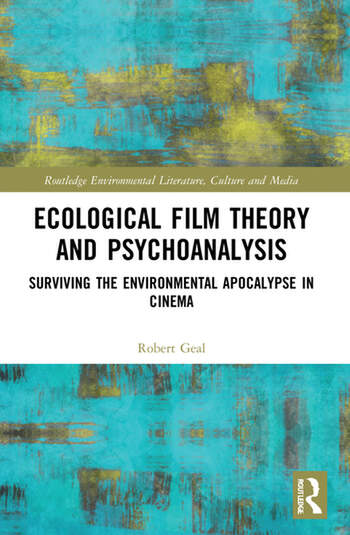Ecological Film Theory and Psychoanalysis: Surviving the Environmental Apocalypse in Cinema

Book Details
- Publisher : Routledge
- Published : 2023
- Cover : Paperback
- Pages : 288
- Category :
Environmental Studies - Category 2 :
Psychoanalysis - Catalogue No : 97342
- ISBN 13 : 9781032027760
- ISBN 10 : 1032027762
Reviews and Endorsements
Robert Geal’s meticulous and wide-ranging discussion seeks to understand why despite the heavy presence of environmental issues in film … things are getting much worse. Rather than promoting action, Geal argues, contemporary … films … reinforce the Cartesian separation between the human and nonhuman, what Geal calls the "epistemology we live by." This timely book is refreshing and original, persuasive and accessible, complex and provocative.
Simon Estok, Professor, Sungkyunkwan University, Seoul. Author of The Ecophobia Hypothesis
This is an engaging and compelling analysis of how various filmmaking traditions express, reinforce, and normalize our dominant dualistic Cartesian worldview grounded in a subjectivity of human separation from and domination over nature. Robert Geal productively applies various theoretical strands to the study of cinematic form and content, revealing how films both repress and resurface our awareness of the "ecological precipice at which we stand." This eye-opening study concludes with a cautiously optimistic exploration of a potentially non-Cartesian cinematic practice that, if embraced, could offer an alternative form of spectatorship, one that might be capable of meaningful action in the face of ecological disaster.
Paula Willoquet-Maricondi, Champlain College. Editor of Framing the World: Explorations in Ecocriticism and Film
This accessible, interdisciplinary and carefully argued book contributes to ongoing environmental theories about the impact of dystopian films on spectators. Geal argues that realist dystopian Hollywood films construct the spectator as mastering environmental devastation—a mastery that prevents our taking responsible action. An important book that should be required reading in Environmental Media Studies and beyond.
E. Ann Kaplan, Distinguished Professor of English and Women's Gender, and Sexuality, Studies at Stony Brook University. Author of Climate Trauma: Foreseeing the Future in Dystopian Film and Literature
In Ecological Film Theory and Psychoanalysis, Robert Geal brings psychoanalysis to bear on our response to the oncoming environmental disaster. This approach enables him to see the ideological forces responsible for our inability to act in a way adequate to the disaster. This urgent book is necessary for gaining our bearings today and for understanding the reasons why we can’t.
Todd McGowan, Professor, University of Vermont
Ecological Film Theory and Psychoanalysis addresses the urgent question: What cultural biases might explain our lack of action in response to ongoing ecological destruction? Looking at how a broad range of films deal with non-human beings, ecologies, disasters, and environmental crises, Geal ultimately discovers, like Lacan, that "this lack is beyond anything which can represent it." The challenge of this book lies in the very lack of cinematic solutions it finds to the symbolic hold of Cartesian subjectivity, which reinforces human alienation from the biosphere with every monocular turn of the camera.
Thomas Lamarre, Professor, University of Chicago
In this timely book, Geal contributes to the field of ecocriticism and ecocinema studies by developing a new Lacanian psychoanalytic ecocritical methodology. This book convincingly explains why a rationalistic, Cartesian response to eco-crisis fails. The potential cure, Geal argues, lies in a radical, non-Cartesian turn in aesthetic and cultural practices. A must-read for environmental humanists!
Chia-Ju Chang, Professor, Department of Modern Languages and Literatures at Brooklyn College
An ambitious and daring work distinguished by a rare clarity of expression that adds force to its argument about the psychological alibis enabling our ecological crimes. This is a study of the separation ideologies of our time. … Geal’s theoretically surprising, even bracing, approach illustrates that the "ecological unconscious" glimpsed and obscured in contemporary cinema is the very terrain of the frightening unknown that governs our collective impotence in responding to our ecology crisis.
Anil Narine, Professor, University of Toronto, Editor of Eco-Trauma Cinema

